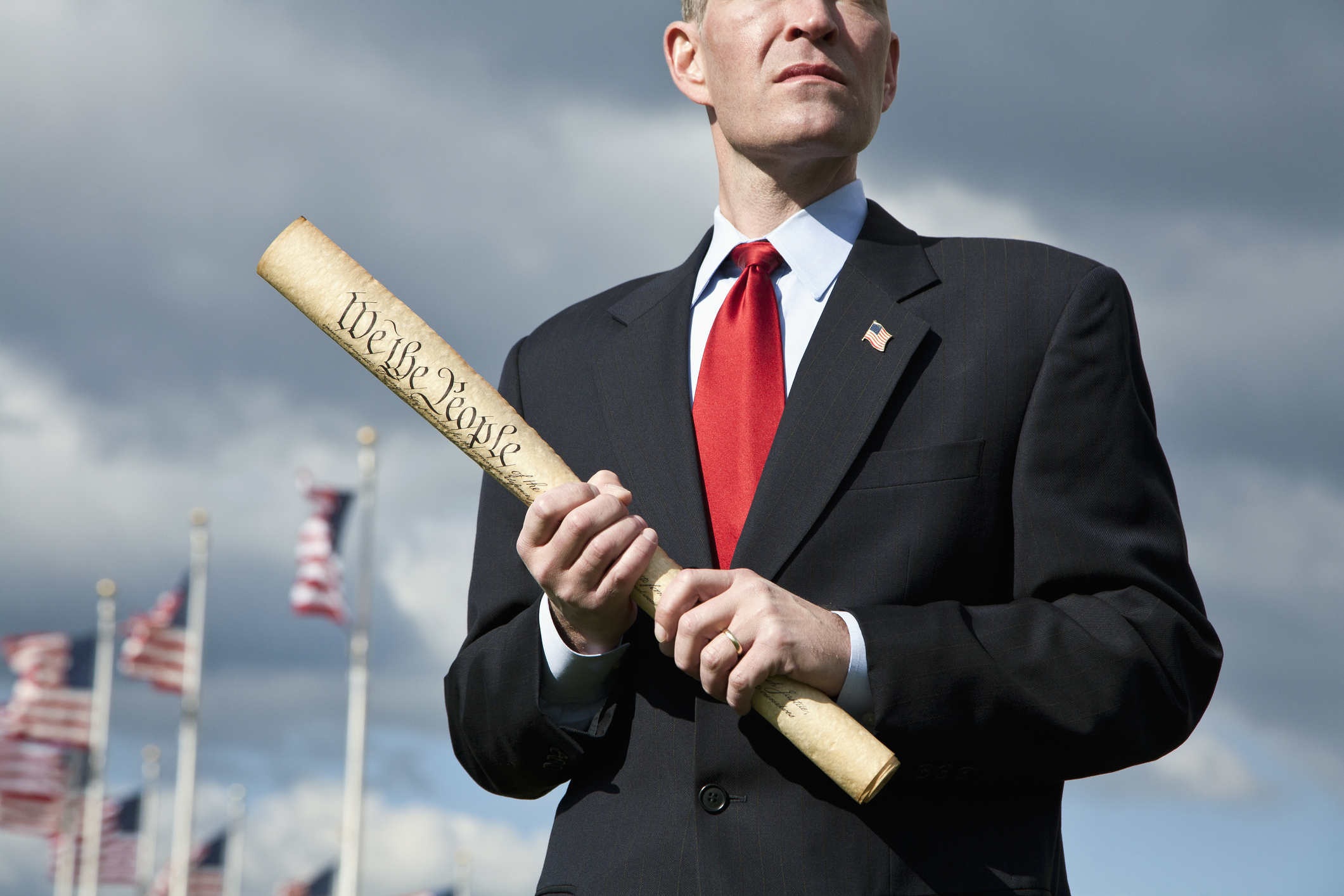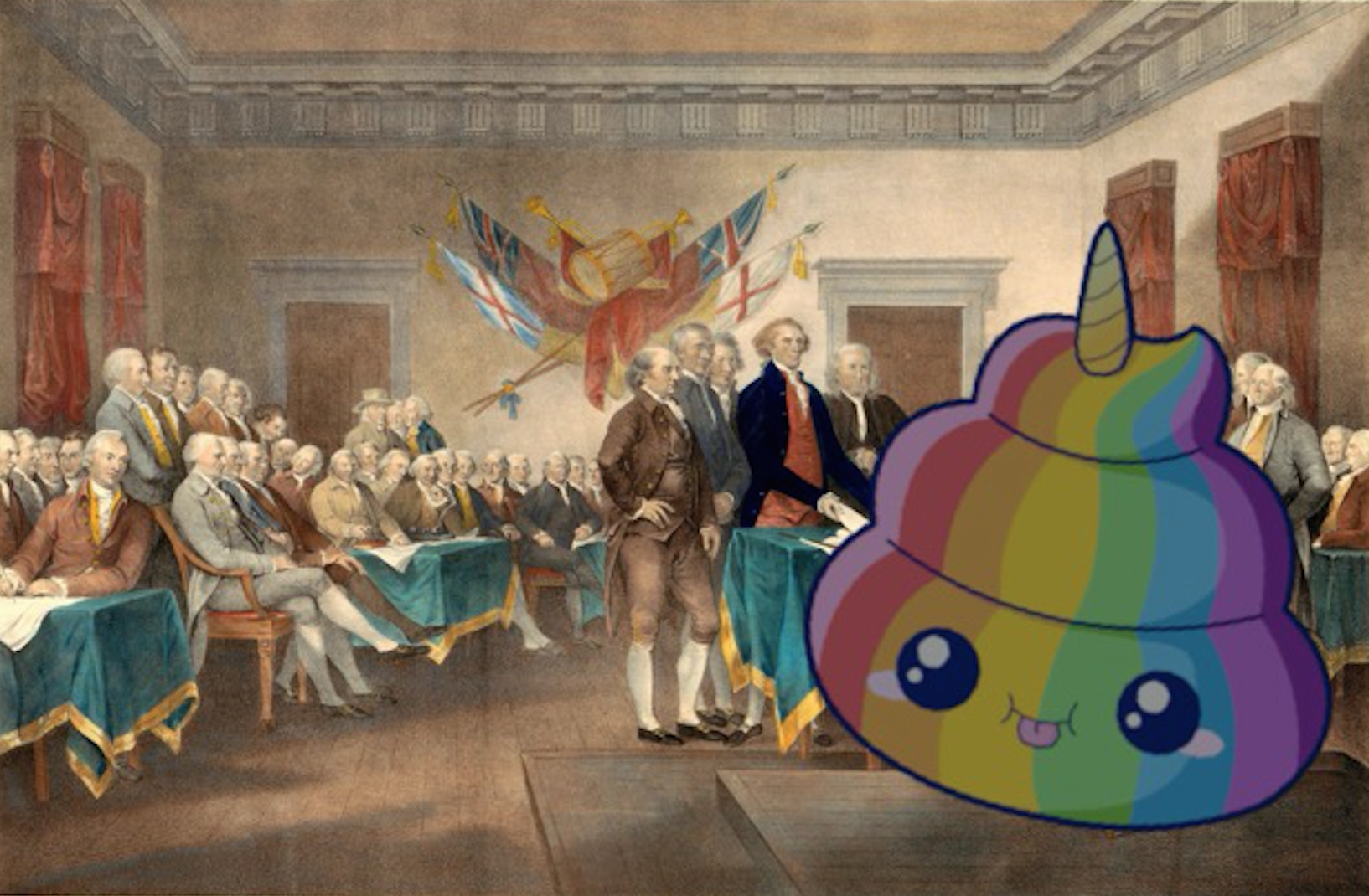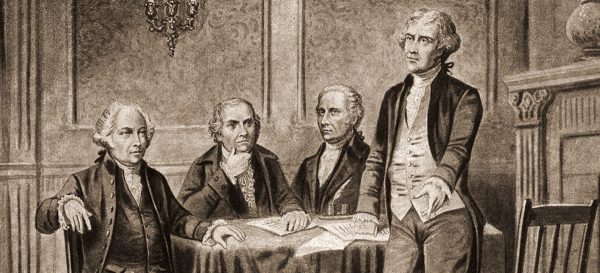The New Right renews Americanism.
Have Some Self-Respect

Restoring America demands reclaiming our sense of honor.
The success of the American Republic, just as much as the American Revolution, depended on the actions of honorable people. Today, we could lose our republic forever depending on whether the American people still have honor—a very specific form of republican honor. If we are no longer capable of living freely as self-governing, self-respecting and self-reliant people, then a servile life under the authority and protection of a ruling class is the best for which we can hope.
Wrought from conflicts among competing American elites, the Constitution bears the marks of the peculiar and very historically specific compromises that made it possible in the first place, but it contains a good bit of deep historical wisdom by learned and practical men. The Framers worried about the threat of parties or factions, and to make sure that good people are chosen as leaders. What safeguards for the diverse liberties of the people can the Constitution supply when morally weak, supine, and demagogic leaders rise to power? From these deliberations and compromises emerged a frame of government that sought to restrict the power of the majority and of powerful minorities. The overriding goal was to prevent tyranny and the resulting threat to the life, liberty, and property of the citizens.
Cause or Effect?
The accomplishment was impressive by any standard—more impressive than such effort since. But the design was insufficient to the task. Many of the leaders in the era understood this. Patrick Henry, for one, scoffed at the idea that a careful design of checks and balances could safeguard liberties. The paradigm of Newtonian physics, which informed the thinking of the intellectuals of the founding era, has not supplied a sufficient mechanism of restraint to guarantee the prevention of tyranny. Something deeper has been at play. The story of American self-rule is really an account of a culture of deep self-respect. This self-respect cultivates pride of ownership—in our nation, our locality, our cultures—and an honor that causes us to champion our better angels.
In a review essay from 1987—on the 200th anniversary of the writing of the U.S. Constitution—historian John Diggins noted that “the Constitution is the effect, not the cause, of whatever stability and success America has enjoyed.” Diggins pointed to the essential truth of Alexis de Tocqueville’s argument in Democracy in America: a mixed government is a “Chimera” and can never really work as a simple mechanism to protect liberty except insofar as the society—the “people”—decide to recognize the limits and balances of the system. All real power in America is vested in the People (and therefore is not mixed but unitary) and no system of government can prevent tyranny unless American society hates tyranny.
The fate of our Constitutional Republic rests with the People only, which is to say American society as it responds to tyranny (often tyranny that gives them comfort or aid). The question yet to be answered, then, is whether the American people are honorable or not. “Republican honor” emerged over time, having roots in both an old English aristocratic honor and nearly two centuries of local self-rule by a wide variety of poor and middling Americans (composed of many ethnicities) prior to the creation of the first large national Republic in history. What emerged over time is a peculiarly American national character, expressed in nearly endless regional and cultural varieties, that placed the self-respect of being self-reliant and self-ruling at the center of its “character.” This character gave to our constitutional system of government its life and its power to check tyranny, not the other way around.
American Character
In the highly localized political societies of the American experience from Jamestown to 1789, representatives of the people’s will were mostly those who had cultivated a public character and reputation often associated with the “gentleman.” Regional differences were profound and one can find many eruptions of the demagogue, but most communities operated with high levels of deference to those among them who had gained reputations for high character, honor, and public-spiritedness. When people of the community turned to such men to represent them, they did so because they believed that they represented both their own ideals, and often to a higher degree than others, and that the men who had earned this public respect were more capable than most of making wise and prudential judgements in the best interest of the community. A representative, thus understood, is not expected to follow the dictates of popular whims. A representative of the people must be a leader, a guide, to the people.
This widespread view of representation was not likely to survive unchanged after a bloody revolution fought in the name of popular sovereignty. Two factors changed rapidly: the nature of the populations choosing their representatives and the scale of power became much larger, as did the stakes. No one at the Constitutional Convention could have understood these forces or predicted how they would play out under the new constitution. Instead, the political leaders of the early republic began with assumptions, beliefs, tactics, and customs that were already out of date.
Joanne Freeman relates a story illustrating the challenges for this generation of leaders in her book Affairs of Honor: National Politics in the New Republic. Alexander Hamilton, one of the most powerful and recognizable national leaders of his generation, chose to respond to an angry crowd that had gathered in New York City to protest the Jay Treaty. Having circulated handbills appealing for calm and a serious examination of the treaty, Hamilton had reason to believe that his reputation as a good and honorable man with a long history of devotion to the American cause would inspire the necessary deference for him to speak and to explain. Hamilton’s position was not that these people could not understand the issues or that they were incapable of being informed citizens; rather he assumed that they would listen to him because popular sovereignty implied a healthy deference to people like him who had devoted their lives to public service and had a record of conscientiousness.
Hamilton reckoned incorrectly. “At the stroke of twelve,” Freeman notes, “Hamilton mounted a stoop and began to address the crowd, only to be silenced by ‘hissing, coughings, and hootings.” Other efforts to address the crowd failed. Not only did someone strike Hamilton in the head with a rock but he and his compatriots had no choice but to leave unheard and disrespected. “Hamilton asserted his right to guide them as their superior—and the crowd responded with rocks rather than deference.” Clearly, a gap had developed between the norms of the recent past and emerging demands for a new kind of representation.
The relationship between popular will and political leadership was changing in the Early Republic. Historians and political theorists apply simplistic labels to this process and the one we most hear is “democratization.” However true it might be that Americans expected and demanded that their opinions, tastes, and interests be heard by leaders and by their various governments, the actual dynamics at work are far too complicated to be contained by such a deceptive label. The rise of an American character—an approach to life and to self-reliance—would become the defining American expression of a national personality. This American type or character is deep within our culture and it emerges when Americans face, as we do today, threats to our right to be self-reliant and independent. In our myths, in our hopes, in our nostalgia, and even in the deepest currents of American experience, this is the American character that we most cherish as ours—ours peculiarly.
The core of honor is protection of one’s reputation and a code of conduct. Certain virtues are typically necessary to a useful concept of honor, including honesty and a willingness to stand for principles even when those are unpopular. An honorable person respects himself in several ways: he respects the standards for which he stands, he respects his ability to be self-reliant, and he respects his virtues as they relate to obligations to others—being a good neighbor and participating with others in the act of self-rule that brings about the highest version of republican honor.
If colonial Americans borrowed aristocratic forms of honor in their search for fame and influence, the people of the New Republic found in their own experiences and accomplishments the core ingredient to a new kind of honor: they had long taken care of themselves and they aimed to keep doing that. They respected their own accomplishments, took responsibility for their own failures, and developed the habits of mutual respect that served well in the great community-building century of westward migration that followed.
As with aristocrats, this honor was far from universal—a great many people were dishonorable. But the accessible idea of republican honor produced a nation of expansive freedom rooted in an orderly system of self-regulation. We see clear but different forms of honor in feuding families of the Appalachians and then very differently a sense of honor among those famous but misunderstood WASP patricians of nineteenth century Philadelphia. But the many varied systems of honor across American history had the virtue of self-respect that was earned through often difficult trials of depending on themselves, their families and their communities rather than on experts, administrators, or some group of benevolent “betters” whose governance, whether good or ill as governance, was demeaning to the governed.
Versions of Honor
The American concept of character and honor would develop over time, find expressions in frontier varieties of Davy Crockett or Andrew Jackson but also more cultivated species found in Abraham Lincoln and Frederick Douglass. Unlike the frontier version made famous in history by Jackson (and countless Hollywood westerns), where one had only to look inside one’s self to find the necessary virtues, Lincoln and Douglass (in what might be called the Whig or Republican species) stressed the self-education, the self-cultivation required of each person who wishes to live well as a human. Real self-rule, and the attending self-respect, was the product of refinement and cultivation of our best selves, accomplished in many ways.
Because this version of honor recognizes that one can be enslaved to the natural self, the American ideal is always about self-improvement. Here we have a concept of American honor that would become the stuff of American myth—the expressions of ourselves that we have long sought to live up to. So much of popular culture in the late nineteenth century until the late twentieth century (with code words like “individualism” and “self-made”) testified to the power of this concept of the self-cultivated person who lives according to honor because he respected himself and his ability to take care of himself with his neighbors and family.
This republican species of honor, then, expects government to provide the conditions that allow individuals and families to be at liberty to pursue their lives based on their own choices and to do this largely within the context of their self-governing communities. The greatest internal danger to this concept of honor is the development and spread of rule by administration. When Congress and other elected bodies are representatives of their constituents and their interests, a self-respecting people can fight out differences in policy through elected governmental bodies. But when our government becomes our protector, when we defer to the judgment of administrators and other helping professionals to take care of us in ways that we had long done ourselves, then the very conditions necessary for honor are destroyed. We become servants of a distant government and that government serves us what it deems to be in our proper interest. Under these conditions we can no long have the self-respect necessary for honor and we have given up any meaningful self-rule in favor of ease or comfort—we have relinquished the very obligations that helped define our character.
Early signs of this development are found when we no longer feel the need to engage in self-cultivation relative to a higher ideal or version of ourselves, when we are no longer interested in an education that forms our best selves, but we favor means (including education) that makes us more rapacious consumers and more self-absorbed subjects of a rich nation. Once we have done this, we do not believe that taking care of ourselves is more noble than being cared for by a system that we do not control and cannot understand. We quickly give our children over to the state and in this way discharge our obligations of educating our young because we expect the state to know better than we do what children should learn. We happily bequeath to the state the powers to take care of the poor around us so long as we are also protected from the consequences of our own bad choices. When distant and murky powers both inside and out of government take responsibility for feeding us the information and versions of reality that violate our own experiences, then we know that we are subjects in some simulacrum of a self-governing republic.
Who Are We Now?
And this is where we find ourselves. The overriding questions is whether we have honor. Do we have the self-respect to hold ourselves to higher standards, to assert our ability to be self-reliant, to demand that as self-reliant people that we be self-governing. If we accept the plans of our “betters” to take care of us then we cede our American right to take care of our own interests, to believe as we wish, to associate and worship as we choose. And if we comply with them, tolerate their insulting attack on our honor, then we have no reason to complain of our overlords. But if we choose self-respect and demand our right of self-rule (as individuals and as groups), then the American Constitution, and the political culture it supports, will return. It all begins with honor.
We must begin with the foundation—the floor of our national honor. Do not send your children to public schools if they don’t reflect your values. Fight for every seat on the city council, every school board, every local office you can. Devote yourself to self-rule at the local level. Refuse to comply with administrative systems that seek to compel you to act (to believe, to assert, to comply) against your standards and judgment. Resist both the bland administrative apparatus and the vocal mobs and choose self-respect and honor over a servile and comfortable life.
Recognize and internalize the fact that the federal government, the most powerful corporations, most media, institutions of higher learning, are all lying to you, are manipulating you, and are seeking to crush your honor and your capacity to be self-reliant and self-ruling. Reject lies and speak the truth that emerges from your real experiences rather than the virtual reality of our overlords. Their lies will include slander of you and your values and so you must prepare to resist the pressure and teach your children to be self-reliant and self-respecting. You must associate with like-minded people and build organizations and institutions that build out your ideas into the world in which you live. You must assert your Constitutional rights (which requires that you learn them) and realize that those in power do not respect them. Whatever else you might say about these specific rights, they are your inheritance and, in our case, they rest on the normative truths of both natural law and natural rights.
In the end, an honorable, self-respecting and self-governing people takes care of themselves. They create the context in which they and those around them can cultivate the virtues and habits that lead to a good and honorable life. In some ways we begin again, but we do so with deep structures, produced by hundreds of years of social and cultural development. We are called to be true to ourselves and it is as simple as that. Self-loathing leads to tyranny, but self-respect is the foundation of an honorable nation in which the citizens learn to be self-reliant and proudly self-governing.
The American Mind presents a range of perspectives. Views are writers’ own and do not necessarily represent those of The Claremont Institute.
The American Mind is a publication of the Claremont Institute, a non-profit 501(c)(3) organization, dedicated to restoring the principles of the American Founding to their rightful, preeminent authority in our national life. Interested in supporting our work? Gifts to the Claremont Institute are tax-deductible.
We must not ignore our extraordinary blessings.
A response to Christopher Flannery.



